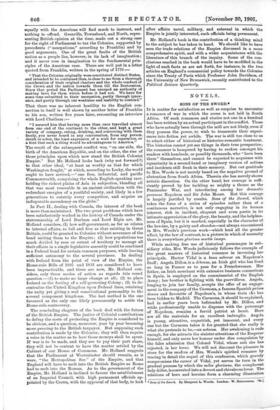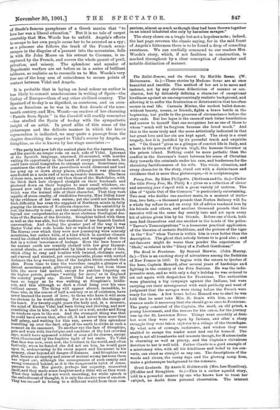NOVELS.
SONS OF THE SWORD.*
IT is matter for satisfaction as well as surprise to encounter a romance of war in which the scene is not laid in South Africa. Of such romances and stories not one in a hundred has been written by an actual participant in the conflict. Those who have actually been through the mill are not likely, even if they possess the power, to wish to transmute their experi- ences into fiction yet awhile. The war is still too close to us to admit either of historical or historico-romantic treatment. The historian cannot yet see things in their true perspective; the romancer is hampered by having to reckon amongst his readers with hundreds, or possibly thousands, who "have been there" themselves, and cannot be expected to acquiesce with equanimity in a second-hand or imaginary version of actions and incidents still fresh in their memory. But our gratitude to Mrs. Woods is not merely based on the negative ground of abstention from South Africa. Therein she has merely shown artistic discretion. On the other hand, her courage is suffi- ciently proved by her tackling so mighty a theme as the Peninsular War, and introducing among her dramatis- personae Napoleon and Sir John Moore. But this courage is largely justified by results. Sons of the Sword, which takes the form of a series of episodes rather than of n continuous narrative, is not onl3r engaging in its human interest, rich in incident, eloquent and even poetic in its intimate appreciation of the glory, the beauty, and the helpless- ness of Spain, but it is marked, especially in the character of the heroine, by a gaiety and abandon—not always encountered. in Mrs. Woods's previous work—which lend all the greater effect, by the law of contrast, to a picture in which of necessity there is everywhere plurima mortis imago.
While making free use of historical personages in sub- sidiary roles, Mrs. Woods judiciously follows the example of the great masters of historical romance in inventing her principals. Hector Vidal is a beau sabreur on Napoleon's Staff; Angela Dillon is a detenue, an Irish girl who has lived so long in France as to pass for a Frenchwoman. Her father, an Irish merchant with extensive business connections in Spain, is employed on the commissariat of the English• Army ; her brother is fighting with the guerrilleros. Angela, longing to join her family, accepts the offer of an engage- ment in the company of the Carmona, a famous Spanish prima. donna and favourite of Napoleon's, in whose train she has been bidden to Madrid. The Carmona, it should be explained, had in earlier years been befriended by Mr. Dillon, and while professionally unable to dispense with the patronage of Napoleon, remains a fervid patriot at heart. Here are all the materials for an excellent imbroglio. Angela is young, attractive, coquettish, yet innocent, and every one but the Carmona takes it for granted that she really is what she pretends to be,—an actress. Her awakening is rude enough, for she attracts the sinister attentions of the Emperor himself, and only saves her honour under dire compulsion by the false admission that Colonel Vidal, whose suit she has rejected, is her lover. We will not discount the pleasure in store for the readers of Mrs. Woods's spirited romance by tracing in detail the sequel of this confession, which gravely compromises the career of Vidal, yet serves its turn in the gradual process by which the miles gloriosus, the complacent lady-killer, is converted into a devout and chivalrous lover. The relations of hero and heroine form a charming illustration
• Bons of the Sword. By Margaret L. Woods. London: W. Heinemann. f6s.1 of Steele's famous paraphrase of a Greek maxim that "to love her was a liberal education." But it is no tale of carpet courtship that Mrs. Woods has to unfold. Angela's efforts to escape to her own people cause her to be arrested as a spy; as a prisoner she follows the track of the French army, escapes in the disguise of aepeasant into the mountains, falls in with Sir John Moore on his retreat to Corunna, is re- captured by the French, and covers the whole gamut of peril, privation, and misery. The splendour and squalor of Napoleonic warfare are set before us in a series of brilliant tableaux. so realistic as to reconcile us to Mrs. Woods's very free use of the long arm of coincidence to secure points of contact between Vidal and Angela.
It is probable that in laying on local colour an author is less likely to commit anachronisms in writing of Spain—the Cathay of Europe—than of any other civilised country. The Spaniard of to-day is as dignified, as courteous, and on occa- sion as ferocious as he was in the first decade of the nine- teenth century, and Mrs. Woods—as readers of her charming "Pastels from Spain " in the Cornhill will readily remember has studied the Spain of to-day with the sympathetic
insight of an artist. In proof alike of this sense of the picturesque and the delicate manner in which the hero's regeneration is indicated, we may quote a passage from the chapter describing the sequel to Vidal's rescue by Angela, or Seraphine, as she is known by her stage associates :—
"The party had now left the soaked plain for the barren Sierra, and the guards no longer rode on each side of Vidal. Ignorant of the Spanish language, unarmed, ill-mounted, with murder waiting its opportunity in the heart of every peasant he met, he could have small temptation to attempt escape. Sometimes one, sometimes the other of the guerrilleros would dismount and lead ber pony up or down stony places, although it was almost as sure-footed as a mule and of more agreeable manners. The faces of these men, more rudely cut than those of the Madrileilos, with the thick dark hair chopped straight on their foreheads and plastered down on their temples to meet small whiskers, ex- pressed now only that good-nature, that sympathetic courtesy which was the normal side of their character. That they were capable of stern cruelty, of vindictive ferocity, Miss Dillon knew by the evidence of her own senses; yet she could not believe it. Such difficulty has even the supplest of Northern minds in fully grasping the elements of Southern character. The amiability is real, the ferocity is real ; and the combination is nearly as much beyond our comprehension as the most abstruse theological doc- trine of the Nature of the Divinity. Seraphine talked with them as well as she was able, but the weakness of her Spanish limited conversation. And during the greater part of the way it was Hector Vidal who rode beside her or walked at her pony's head. The Sierras over which they were now journeying were scarcely mountains, but rather hills, of a kind which in another climate would be clothed with fern and heather, and wrapped about the feet in a velvet luxuriance of leafage. Here the bare bones of the ancient earth are scantily clothed with low grey thymey- scented shrubs, or overshadowed by black woods of pine or ilex, which cling to crag and boulder with twisted, obstinate roots, and starved and stunted, yet unconquerable, plume with serried darkness the long waving line of the heights which overlook the plain From time to time the travellers caught a glimpse of a distant mountain-peak, glittering pure silver; but from these hills the snow had melted, except for patches lingering on the higher points, perhaps waiting' for more,' as in England the country people say. Hector Vidal had never in his life been so happy as he was walking at Sdraphine's bridle- rein, and this although so dark a cloud hung over his once brilliant career. The thing will appear absurd, incredible, to those who, in the course of half a century or so of existence, have never learned the secret of love ; to those who have it will seem too obvious to be worth stating. For so it is with the things of the heart. For twenty-eight years the body and, in a measure, the mind of Hector Vidal had been living and thriving, and now something else in him, call it a heart or a soul, awoke and flung its windows open to the sun. And the strangest thing was that he could have sworn that, after all, it had never been more than half asleep, and waiting for this sun, aware of this splendour travelling up over the dark edge of the earth to strike at such a moment on its casement. To another eye the face of Seraphine, pale and worn with the fatigue and emotions of the List crowded days, would have appeared robbed of near all its charms, except when illuminated IT the fugitive light of her smile. To Vidal that face was now, even now, the loveliest in the world, and often furtively, when he fancied she did not see him, he would gaze upon it, endeavouring to fix every aspect and lineament iu his memory, clear beyond all danger of dimness. And Seraphine was glad, because all enmity and sense of mutual wrong between them was wiped out, although the consequences of such enmity and wrong remained behind, as it is the disagreeable habit of conse- quences to do. Her gaiety, perhaps her coquetry, reasserted itself, and they made some laughter and a little wit as they went. What they talked of is not worth recording, for while speech is the embodiment of thought, it is only the electric wire of emotion. They too seemed to belong to a different world from their com- panions, almost as much as though they had been thrown together on an island inhabited else only by harmless savages."
The story closes on a tragic but not a hopeless note ; indeed, the last page reverses the classic saying, for in the mid fount of Angela's bitterness there is to be found a drop of consoling sweetness. We can cordially commend to our readers Mrs.
Woods's story, which, if not faultless in construction, is marked throughout by a clear conception of character and notable distinction of manner.















































 Previous page
Previous page